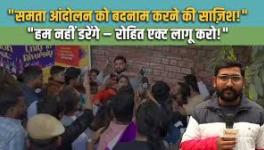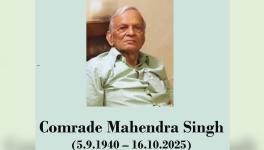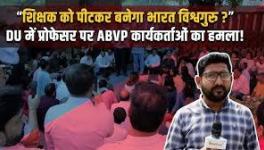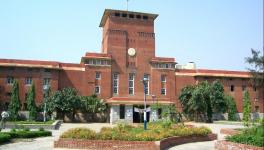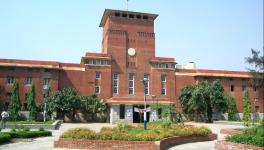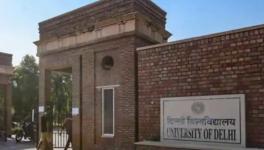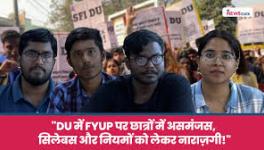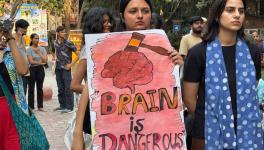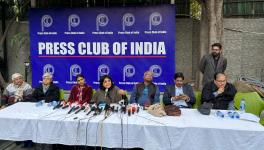Ramanujan's Essay depicts Multiplicity of Views through many Ramayanas – B. Pati
The deletion of Three Hundred Ramayanas from B.A. History course of Delhi University. Professor Biswamoy Pati of History Department of D.U. calls this intolerance a dangerous trend.
Rough Transcript
Jyotsna Singh (JS): The deletion of an essay by famous scholar A.K. Ramanujan from the history syllabus of B.A. Honours of Delhi University has created a controversy over the subject. On the one hand is the Academic Council of the University which says that the essay hurts sentiments of a particular community. On the other hand, the History Department has come out in open to support the essay saying that it should not have been deleted. Today we are joined by Dr. Biswamoy Pati, Associate Professor in the History Department of the Delhi University, to talk about the issue. Welcome to the show, Sir. So what are the circumstances which led to this kind of a situation where on the one hand the essay has been deleted; on the other the History Department does not agree with this.
Biswamoy Pati (BP): You see this goes back to three years or so (when, the exact date etc., I don't remember because I had not joined the department at that time). What had happened one day was that suddenly, we will call them goons, let's say, of ABVP, landed up and our Head at that time of History department was Prof. Jafri. They shouted slogans, people were pushed around and some glass panes were smashed and the whole idea was that this is an offensive text and apparently somebody filed a writ petition or something like that. Supreme Court gave the direction to the University asking it to ask four experts to sit on judgment and say whether the text needs to be deleted or is it OK. Incidentally, this is not a part of the B.A. (Honours) History programme whatever we call it. This is something which is called a concurrent course in which people from other disciplines are expected to study this text. It is not the only text. There are four-five options, that can easily be verified by you.
Then the question was, the first thing was at that time it was a rude shock. There were very serious resolutions, there were many protest letters etc., and in all fairness let's be very clear nobody knows who those experts are and the University decided who to select. What is interesting is that the last meeting you are referring to, apparently the reports of the four referees were tabled and three of the historians, whoever they are, not only thought that it is very interesting text and it should be retained. But most significantly, there are historians and historians and if you want to play foul there are many ways of doing it and I think it to be something that is very interesting to actually note. I have not seen that reports but I have been told that the fourth historian, whoever he or she is, suggested that this text is very interesting, it can be taken as a serious text; but it can hurt the sentiments of the people who are young. To hide behind all that, the suggestion apparently is to include some texts or some material by R.S. Sharma and Romila Thapar. Obviously, as I told you, this whole thing is mischievous. It is very unfair to have a meeting where in the name of democracy, people who have no idea about either the text or Ramajunan's or his works or his contributions, are allowed to discuss. What is very remarkable is that the whole process of the debate which, apparently democratic debate I was told, lasted for four hours over which apparently, it was not the question of history, the meaning of rationality, science, the question of diversities of our very rich cultural heritage, our rich pluralistic past; our as not necessarily Indian but as you know Ramayana, the text has references to what could be called Near-East -- Thailand, Cambodia and how people will relate to Ramayan there. In the name of sentiments being hurt a text which is an optional text is dropped. It was very interesting that along with the University establishment, the Congress official, the Congress unofficial and the BJP were on one side. And there were nine people who were defending the fact that 'please don't do this'. The head of the department pleaded saying that the Supreme Court has not told us to drop or accept this but Supreme Court has told us to take opinions and let us go back and tell the Court that these are the opinions. Let us look at it in this way that you know let it be discussed and debated. May be it can go to the History Department. Various things we can also add.
If I were to talk like a scientist, I would argue that we had Galileo, we know the experience. when Newton discovered gravity on the basis of that apple falling, may be the Academic Council sitting on judgment, they would have persecuted Newton like Galileo was! So that is how the story is.
What is also very encouraging is, I must add, the Sanskrit Department Head supported the History Head. He was among those nine people and the argument given was very interesting. The argument given was that, very rational and very scientific argument, I was told that the Sanskrit Department Head argued that we teach things where we discuss the parts of the female body, female sexuality and various other complicated things which might appear very difficult to teach and we teach them. What is so terrible about it? This has been done by people who obviously are teachers like us they might have looked at all the pros and cons and decided to take something and it is an option. Similarly, the Punjabi Department Head, Commerce Department Head -- extremely rational – they argued in the same genre and obviously some people have decided to offer this as one of the four or five texts and let that be and why do you want to interfere. I don't want to use strong words but this is a reminiscent of this whole idea of pushing an agenda which has no academic standing, which is irrational, which goes against the very basic sort of idea of what could be called India.
JS: Do you think that the central point of the debate is not the procedural lapses but the fact the multiplicity of the views, of points of view, it's an attack on that?
BP: It's an attack on the very fabric of, it is an anti-national act, I will argue, because you were not acknowledging something that is called South India. It's not a question of a text. A text is completely harmless. I will appeal to all these people who are so angry including the ABVP students and everybody who supports it also this idea that this text should be there. Look at this text. You know in fact if I am not wrong. I have read it many times most probably it started by saying three hundred Ramayans or one thousand. In fact, I'll add, a million Ramayans. I keep on giving this example, in Orissa actually if you check the different districts what we call in India. There are different districts every state has. I know there are at least three four-Ayodhyas. In Oriya we call it 'Ajodyas'. Which becomes Ayodhya, as you come here. There itself is the plurality of how we pronounce the names. You call it Rama, I will call it 'Ramao'. This itself shows what I am trying to get at which is you can not have one version of anything. Beyond sciences, in social science to imagine that you discuss something without the possibility of debating that basically means that you are looking at zombiaising the whole and I think this is tying up with the neo-liberal thinking process where you are supposed to be dumb creatures. You are not supposed to question anything.
JS: If you could just talk about the text because it is a different kind of genre that is there and why is this particular in your opinion I mean though I understand one has to go beyond it. But still coming back to to the text do you think there is some importance we can attach to the text per se in this particular case.?
BP: The significance of the text is purely related to the fact that it is a brilliant mind and nothing else and the brilliant mind is trying to take you through a journey may be 40-45 pages. They are trying to take you through a journey and the journey where may be I don't know it appears as if he is also thinking as he is writing. It's not just an attempt to communicate something in a very formal academic way. You see the type of references, the way he moves, he talks about Tulsidas, he talks about so many other Ramayans. You know for e.g. we all know very well that there are traditions where Rama and Sita are brothers and sisters. It is so interesting. What is so wrong about it? It's there. You can't murder me because I am saying that Orissa has three Ajodyas. It is not my fault. At the same time, I wish that certain things are done in the way that people read things. I remember Tamas, that was the Janta Party regime much before your birth. You were just born I remember a very classic statement of Advani, he was the Information Minister that's where the debate focused for some time saying that “I have not read Tamas, I won't read Tamas, but it should be banned”. I think India had troubled quite a bit from that phase but Delhi University shows that we are going back to the period I am talking about Advani's famous statement.
JS: I think out of all these, an important question arises that why History as the subject has always been attacked by the right wing? Be it during the NDA government we had this whole revision of text books where history and myth were combined in a sense. What do you think is that importance of history where it comes under attack.
BP: It is not India only. If you look at German Fascism, if you look at Hitler's rise, I mean it is a part of that whole process because this is a discipline and let's be very clear I take pride in the fact that Indian History you know the way things stand today it is a very very developed history world we have. We have fascinating scholars. Today the type of work that historians work on even five, ten years back you would not have imagined that somebody will work on a little lunatic asylum. Some body will work on for e.g. Indian History Congress, if you look at papers. If you are really a good Historian, you will definitely have certain basic beliefs accepting liberalism as a major feature.
JS: Could this fear of History be also because a community finds it's identity, or there is always an attempt to link a community's identity, to the past and therefore, history as a discipline becomes important to attack?
BP: Anybody who has a very basic understanding of the rhythms of History will obviously like to question that very feature that how can you identify anything with a particular community, or a particular religion, or a particular language and we look at interactions. I mean the basic thing is that imagine how the world would have been if you had one version of Ramayana. It would be terrible. What would we discuss then? It would have been the end of history because there is nothing to debate. If we have one interpretation of how human beings came to this planet, how they emerged or evolved -- imagine how horrible it would be. You can put it this way that probably there is tremendous fear and insecurity within the discipline because the discipline actually subverts the basic agenda or programmes that some of these people propagate.
JS: Thank you Sir. Thank you so much. It was an enlightening discussion.
Get the latest reports & analysis with people's perspective on Protests, movements & deep analytical videos, discussions of the current affairs in your Telegram app. Subscribe to NewsClick's Telegram channel & get Real-Time updates on stories, as they get published on our website.









